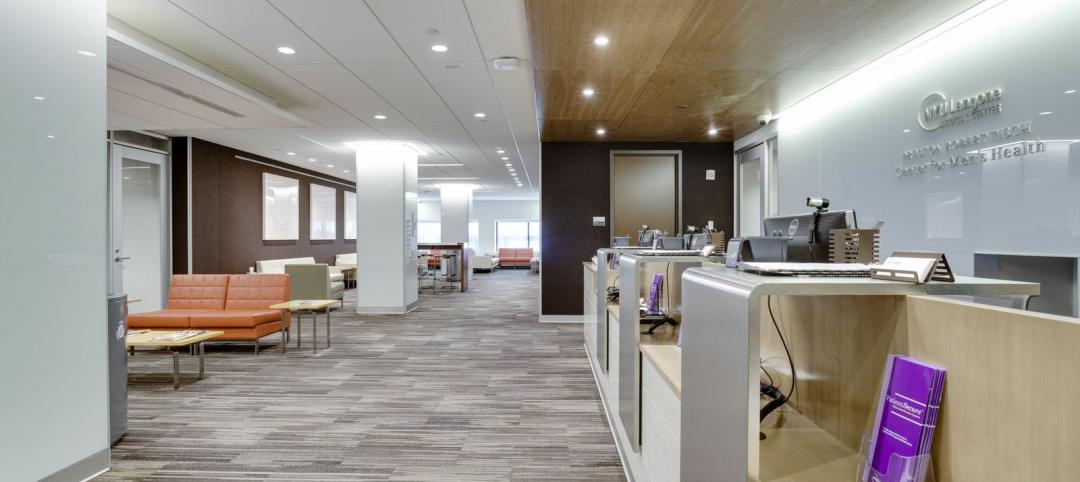NELSON, the Philadelphia-based interior design firm celebrating its 40th anniversary this year, has merged with two other firms, Cope Linder Architects and KA Architecture, to position itself as a full-service architectural and design outfit across multiple nonresidential building types.
The combinations became effective on June 1.
Founded in 1977, NELSON has steadily expanded for more than 15 years, primarily through acquisitions. In the past two years alone, it bought EHS Design and Marvin Stein Associates in Seattle, AAI in San Jose, and VeenendaalCave in Atlanta.
John “Ozzie” Nelson, Jr., NELSON’s Chairman and CEO, tells BD+C that his company’s marriages with Cope Linder and KA are the first of a series of mergers that NELSON plans to announce this year. Nelson says his company in 2017 would double its revenue to around $200 million and its workforce to “north of 1,200” from 625 at the start of the year.
Nelson and Ian Cope, AIA, LEED AP, Principal with Cope Linder Architects, had been talking, on and off, for 27 months about bringing their respective companies together. Cope says his firm had also been approached by two other suitors—including a Canada-based engineering firm—which it ultimately rebuked, he says, because it feared it might lose its identity with clients “who are concerned about all of this massive absorption of AEC firms” going on in the industry.
The addition of 50-year-old Cope Linder, also based in Philadelphia, makes NELSON that city’s third-largest studio, with more than 125 employees there. Cope Linder is best known for its work in the commercial, hospitality, gaming, and entertainment sectors. One of the first projects to be completed under the combined company will be the 51-story, 773,000-sf W and Element Hotel in Philadelphia, which opens next year.
Craig Wasserman, RA, Executive Vice President at KA Architecture, says his firm has been predominantly a core and shell builder and planner. It has tried to diversity on its own, “but it never worked out,” he explains. The merger with NELSON, on the other hand, “is the perfect compliment,” and allows KA to go to market as a full-service firm. “We’ve been telling our clients about this merger, and their reaction has been fantastic,” says Wasserman.
Cleveland-based KA Architecture—which was founded in 1960 and, prior to the merger, was into its third generation of ownership—has lent its design services to, among other projects, retail centers, mixed-used developments, and hospitality. Its merger with KA represents Nelson’s third location in the Midwest. The 1.3-million-sf Liberty Center in San Francisco will be the first major project completed under the new brand KA Architecture, A Nelson brand. (KA is the Executive Architect on this project.)
KA and Cope Linder are also forming a core-and-shell practice within NELSON, says Wasserman. Nelson states the combinations place NELSON more competitively into the high-rise architecture market.
The mergers also allow NELSON to launch a newly formed Hospitality Practice, and to beef up its Retail Practice.
Merging for the right reasons
Diversification is certainly one of the drivers behind NELSON’s acquisitive streak. For example, it is close to announcing another acquisition of a firm in New York that surveys and inspects buildings. Under Title 11, buildings over six stories high are required to be surveyed every five years. The firm NELSON would acquire already handles 800 of the 14,500 buildings in New York that fall under that regulation.
NELSON also runs a $13 million MEP engineering firm under a separate brand. But Nelson has never been a believer in combining architecture with other disciplines, such as engineering or building surveying, under one roof. He thinks the better solution to integrate vertically is to create holding companies to run those businesses separately, as it will the core-and-shell entity.
“Culture trumps everything else” when it comes to merging companies, says Nelson, speaking from experience. “It’s important for companies to look at the complete nature of coming together, and to be realistic.” He observes that, too often, smaller firms want to merge with larger firms just to take advantage of their marketing and sales clout without giving enough thought to how such a move might impact their employees and customers.
Nelson confirms that the managements of Cope Linder and KA are remaining with the company. He says NELSON looks for acquisition partners whose managements want to stay on with the combined firm.
When asked why so much AEC consolidation seems to be happening all of a sudden, Nelson says that relationships between firms and their clients don’t matter as much as they used to. “Everything has become a beauty competition,” and size, he says, has become a more important criterion to be considered for certain projects.
In the future, he says that NELSON will be looking to strengthen its position in Texas and the Washington, D.C. market.
Related Stories
| May 29, 2014
Wood advocacy groups release 'lessons learned' report on tall wood buildings
The wood-industry advocacy group reThink Wood has released "Summary Report: Survey of International Tall Wood Buildings," with informatino from 10 mid-rise projects in Europe, Australia, and Canada.
| May 29, 2014
Five finalists, including SOM and Zaha Hadid, chosen in competition for Sweden's tallest skyscraper
In Sernecke's competition to design Sweden's tallest skyscraper, five finalists have been selected: Manuelle Gautrand Architects, Ian Simpson Architects, SOM, Wingårdhs Arkitektkontor, and Zaha Hadid Architects.
| May 29, 2014
Retail renovation trends: Omni-channel shopping, personalized experiences among top goals of new store designs
In pursuit of enhanced customer experiences, retailers are using Big Data, interactive technology, and omni-channel shopping to transform their bricks and mortar locations.
| May 28, 2014
Video Blog: How today’s construction firms are bridging the BIM gap
Turner Construction and Parsons Brinckerhoff talk about how BIM has revolutionized the way that they conduct projects, and how technology has allowed them to leverage collaboration in such a way that they can work with decentralized teams.
| May 28, 2014
KPF's dual towers in Turkey will incorporate motifs, symbols of Ottoman Empire
The two-building headquarters for Turkey’s largest and oldest financial institution, Ziraat Bank, is inspired by the country’s cultural heritage.
| May 28, 2014
B.R. Fries completes medical center focused on male health
Occupying the building’s entire second floor, the male-centric center is honeycombed with examination and consultation rooms, as well as areas for noninvasive testing.
| May 28, 2014
Moshe Safdie's twin residential towers in Singapore will be connected by 'sky pool' 38 stories in the air [slideshow]
Moshe Safdie's latest project, a pair of 38-story luxury residential towers in Singapore, will be linked by three "sky garden" bridges, including a rooftop-level bridge with a lap pool running the length between the two structures.
| May 27, 2014
Supergreen Venter lab displayed in new walk-through video
ZGF Architects' La Jolla building for genomics pioneer J. Craig Venter and his nonprofit research organization aims to be the first net-zero energy, carbon-neutral biological lab.
| May 27, 2014
America's oldest federal public housing development gets a facelift
First opened in 1940, South Boston's Old Colony housing project had become a symbol of poor housing conditions. Now the revamped neighborhood serves as a national model for sustainable, affordable multifamily design.
| May 27, 2014
One World Trade Center cuts rents due to sluggish activity
Sluggish economy and lackluster leasing force developer The Durst Organization and the Port Authority of New York and New Jersey to reduce asking rents by nearly 10% to $69/sf.
















